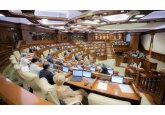
To fight inflation in Moldova we need a more balanced monetary policy and more targeted compensations - Expert-Group.
The Executive Director of the Expert-Group Independent Think-Tank, Adrian Lupusor, stated this in his commentary while formulating in it three basic elements for solving the inflation issue in Moldova. In particular, he noted that there is no magic solution to this issue. The most common measure used by countries around the world is to tighten monetary policy, and Moldova cannot be an exception. Inflationary pressures, even if they have a predominantly external origin, should be contained through a balanced anti-inflationary monetary policy, with a stimulative and targeted budgetary policy towards vulnerable families and without political interference. Adrian Lupusor went on to highlight 3 key elements for more effective anti-inflationary policies: a more prudent monetary policy, depoliticization of the topic, and more targeted social compensations. The Executive Director of Expert-Group noted that monetary policy should focus more on inflation risks and future inflationary pressures than on current developments. As a consequence, monetary policy decisions should focus on anchoring inflation expectations rather than mitigating inflationary pressures that have already materialized. This implies a greater emphasis on the development of macroeconomic forecasts and their fuller integration into the decision-making process (NBM decisions should be focused mainly on future inflation dynamics rather than on current trends), broader and more frequent consultations with business representatives and communication aimed at better understanding and anchoring inflation expectations. Adrian Lupusor stressed that, at the same time, when inflationary pressures are driven by non-monetary factors and the engines of the economy are slowing down, monetary policy should be aimed at adjusting the base rate as early as possible, without a sharp tightening of reserve requirements. Not tightening reserve requirements would allow the government to pursue a stimulative fiscal policy, providing the necessary combination of monetary policy aimed at targeting inflation and fiscal policy aimed at mitigating the social effects of inflation. Executive Director of Expert-Group also called it important to depoliticize the discussions on inflation, to avoid political pressure on the National Bank and strengthen its independence. According to the expert, politicians should refrain from direct or disguised instructions or pressure on monetary authorities. In this regard, the possible parliamentary/political commissions to assess monetary policy decisions should be replaced by a permanent and more effective communication between the NBM, the government and parliament on the inflation situation and the macroeconomic situation in general. At the same time, it is necessary to promote the legislative amendments stipulated in the Memorandum with the IMF in order to strengthen the independence of the National Bank, which is the basis for the macrofinancial stability of the country. Adrian Lupusor noted the importance of more effective targeted compensations for higher tariffs. According to him, although social compensations played an important role in mitigating the social consequences of the gas tariff increase, they can have a greater effect if they are better targeted to low-income families. The head of Expert-Group believes that the simplest formula would be to provide such compensation only to those households that do not consume more than a certain maximum limit of gas per month (a similar mechanism could be applied to electricity bills). The expert noted that the inflationary effect of more targeted compensations to low-income families is much lower than compensations provided to all, because in these conditions, this financial support from the state is directed to the products/services of basic necessity. // 29.06.2022 - InfoMarket







